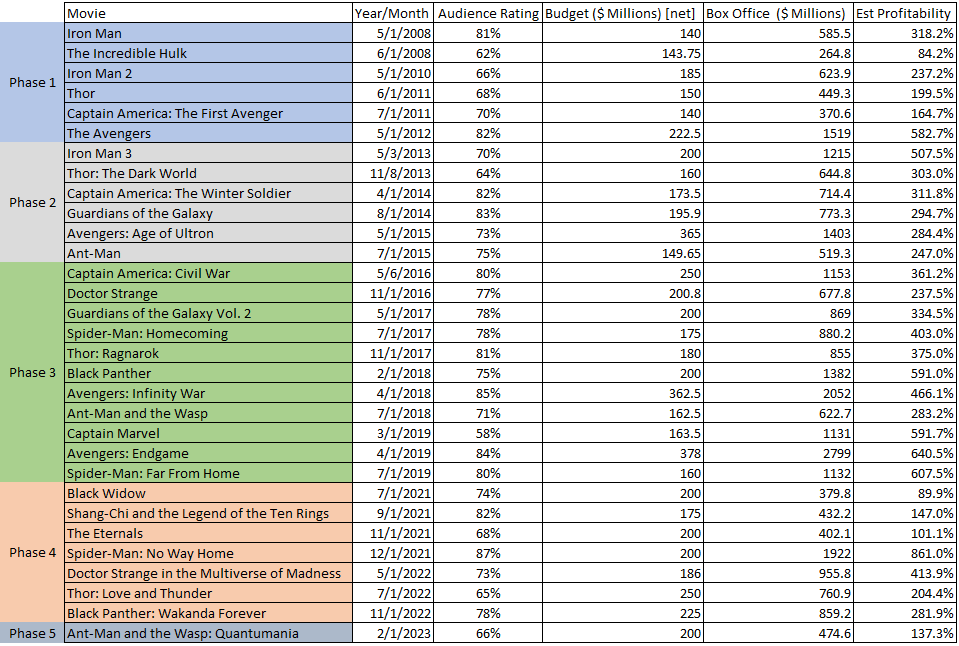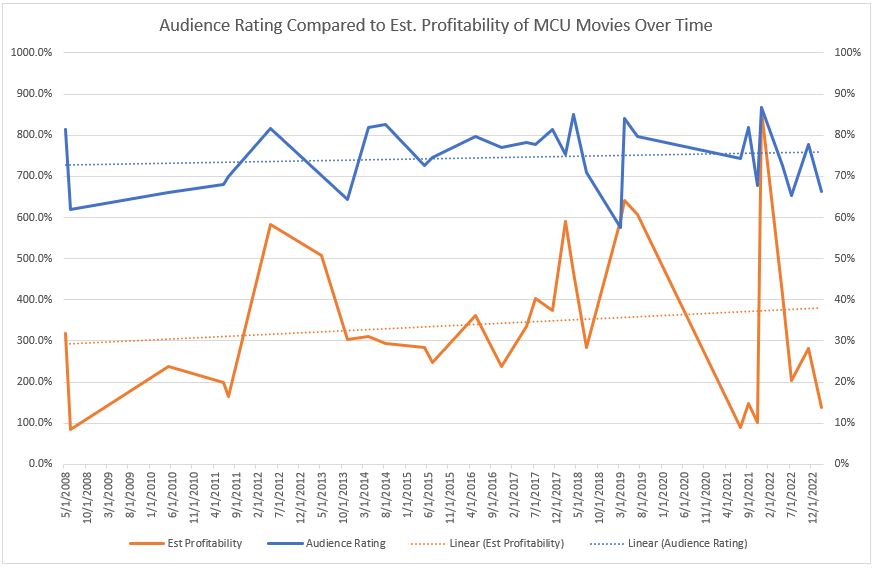
There are naysayers among us who love to say that the MCU is headed off a cliff. It is in a dramatic decline after Avengers: Endgame and if it doesn’t right its course the ship will be lost forever. These wet blankets have a myriad of reasons to make these claims but if you’ve ever watched a YouTube video of these neckbeards the typical causes given for this inevitable doom is either comic book movie fatigue or “wokeness”.
Now, comic book movie fatigue (or CBMF… ask your doctor if Scorsese was right) can easily be proven or disproven with statistics. This isn’t too hard.
“Wokeness” though it a generic and fuzzy term without definition used in discourse to typically discount anything politically to the left of whatever the presenter is discussing. It has the same basic meaning in discourse anymore as “fascism” which is the same thing as “wokeness” only anything politically to the right of whatever the presenter is discussing. Because of this, other than this intentionally inflammatory and insulting paragraph we won’t bring it up because, as stated above, it is without meaning anymore.
To investigate whether there may be CBMF or something else (fascist wokeness?) at play I wanted to look at data. The data I decided to examine is the estimated profitability percentage of the MCU films over time. I picked estimated profitability because this should factor out things such as inflation. If a movie costs more to make because of inflation, ticket prices are also bound to cost more as well also due to inflation. To get this estimated profitability percentage I calculated the net budget against box office totals. To make things quick, I just got the numbers from the Wikipedia page for each film. It has these values in the right-hand window with all the fast facts related to the film (released date, director, distributor, etc.).
Now for some movies, there are two numbers, or a range given for the budget. This is because the only thing more crooked and screwy than politicians is Hollywood accounting. In these cases, I took the average of the two values. In the instances where it specifically stated net budget vs gross budget, I went with the net budget. This is just to make things consistent. In terms of gross budget though that would typically include advertisements and things such as that. It is typically said that a movie needs to be 300% of its net budget to be considered profitable. Again, Hollywood accounting…
Also, to compare, and because I already had this data for another series of articles I’m working on, I decided to also include the audience rating of each film. I aggregated and averaged these from the websites IMDB, Rotten Tomatoes, and Letterboxd. I ignored the critics review score from Rotten Tomatoes for this because I wanted to compare the box office to scores from people who paid to watch the movie (even if it is just a Disney+ account).
Here is that data set:

A few things to note before we get into the chart and trends this data show…
According to this data, the least profitable MCU film is 2008’s The Incredible Hulk, closely followed by Black Widow and then The Eternals. That’s not entirely too shocking. Regardless of your opinions, thoughts, and “research” on the Covid pandemic, it did play a dramatic role on the movie going experience. And it did take general audiences some time to get comfortable going back. This, without a doubt, had an impact on Black Widow, Shang-Chi, and The Eternals. Especially given the high audience scores for Shang-Chi, the profitability of that film based on the box office is still significantly lower than most other films.

Starting in Phase 4 also, was the understanding that within five to six months of a movie’s release we would be able to watch it on Disney+. There then became people, like myself included, that saved their movie going experience for films that felt worthwhile of the cinematic experience (Top Gun: Maverick or Spider-Man: No Way Home) and otherwise choose not to go to the theaters due to generally declining experiences not related to the quality of the movie we’re watching.
This is important to understand because the data isn’t from a vacuum. There are real world experiences and issues to factor into these numbers not related the rating an audience may give to a cinematic experience. Now, do most people agree that Black Widow and The Eternals are boring films? Yes, they both are below average (75%) for an audience rating. Could this lower-than-average rating be because of perceived political ideology of a film? Maybe, but I tend to think general audiences aren’t as aware of these sorts of things especially when being inundated with CGI monsters and explosions. It is also important to note that the perceived political ideology in these movies is generally considered acceptable adult human behavior based on most polling data (this is not a statement on the validity or lack thereof on your beliefs or feelings on this matter, just a comment on the shift in social acceptance), and these moments are brief, fleeting, and not tied to any structural plot and story components of the film as to be easily edited out in any country which may find those moments so offensive as to ban the movie outright.
Also, this data does support the general claim that Captain Marvel was review bombed on Rotten Tomatoes. Both IMDB and Letterboxd, if adjust to match the Rotten Tomatoes percentage would be 63% and 60% respectively, the Rotten Tomatoes score is 45%. This film does have an almost 600% estimated profitability based on the data I gathered, with the average estimated profitability being 344%. Unless those people who rated horrible constantly went back to the theater to hate-watch this film, that score doesn’t entire makes sense, especially when you line it up with the rest of the data. There is almost a direct correlation between the audience rating and estimated profitability. Without the data from Captain Marvel, the correlation coefficient is 0.60 which denotes is a strong relationship.
It falls to 0.42 with Captain Marvel in the data set which suggests it is an anomaly to throw the correlation off that much.
And you can see this correlation in the graph below which shows the two data sets on the same chart where they seemingly correlate except for some odd point in early 2019.

Trend lines have also been added, which do show a steady growth overtime of the profitability of MCU films. The trend line of the audience scores shows it staying relatively the same over time.
The large dip towards the end of the graph is obviously the return back to theaters with Black Widow. The large peak is Spider-Man: No Way Home which includes its box office from its re-release back into theaters in late 2022.
While this data doesn’t entirely support or defeat a position that the MCU is doomed, there is a marked increase towards the tail end of the graph, even taking out the giant gains of the latest Spider-Man release. It is also obvious that MCU films peak and valley during the big team movies and there after respectively. Would the valley after Endgame have been as dramatic if not for Covid? I think most people would assume no, but there would’ve been a marked valley especially given the tepid reviews. And the data does suggest many MCU fans are ready to go back to the theater. Outside of a political ideology, maybe they’re just waiting for a worthwhile movie.
This is being written the day before Guardians of the Galaxy Vol 3 is released. My hope is at the end of Phase 5 coming back and examining this data set again, but up to date at that point to have a better understanding of the state and the future of the MCU.


